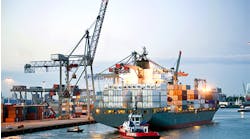It hardly matters now that many people questioned the wisdom of spending nearly $800 billion in federal money in early 2009 to jump-start the staggering economy, nor is there any credit to those who doubted the effectiveness of such a strategy. The debate now is over what can be done to accomplish what the stimulus was meant to achieve 15 months ago — encourage domestic economic growth.
The promise of the American Recovery and Reinvestment Act wasn’t merely that it would stimulate an economy in which business and consumer spending had virtually stopped. The implication of the arguments in support of the Act was that it would become the foundation of a new, more sensible, more equitable, more reliable industrial economy. It was to be the means by which domestic manufacturers regained their footing against the predators of the global economy.
The federal money was to flow toward large-scale, “shovel ready” projects that would spur significant levels of business spending, and thus induce additional borrowing which would prime capital markets, and justify hiring, which would reignite consumer spending, completing the economic restoration. Even better, we were assured that all this would be happen with the stability offered by federal oversight, not the risks that pervade free markets.
What we know now, thanks to a survey of business conducted by the National Association of Business Economics (www.nabe.com) between late March and early April, is that the 2009 federal stimulus has had little to no impact on the economic recovery. There is a recovery underway, as employers slowly resume hiring, and industrial demand is rising, but 73% of the manufacturing executives surveyed could find no connection between their businesses’ conditions and the federal stimulus program.
“Little of the improvement to date in job growth can be attributed to the stimulus bill enacted in February 2009,” writes William Strauss of the Federal Reserve Bank of Chicago. “Capital spending remained steady. Tight credit conditions continued to negatively impact business conditions.”
Again, there is no credit due to those of us skeptics who expected something like this, but there is much to be said about how we proceed from this point. The problem we tried to fix in 2009 — a widespread shortage of wealth to fund the obligations and projects we have committed to — is still with us, and as we look forward now we must realize that we have even greater obligations to the future thanks to the spending we’ve done in the past 15 months. The ineffectiveness of stimulus spending ought to be instructive.
The general problem, as I see it, is an overly simplistic view of economics. There is a constant temptation to apply the principles of personal finance to the world at large. This is not entirely wrong: we should strive to manage our resources wisely and spend them carefully, and we should expect that our political and economic leaders would do the same in their areas of responsibility.
It’s true enough that a person who is deep in debt should not go on an ambitious spending spree, assuming that entering into more and more financial obligations will create a stream of economic opportunity upon which he can regain his solvency. That won’t work for individuals, corporations, or for government.
But, the greater delusion we’ve encountered since 2009 is that which encourages us to think the economic realm can be “stimulated” or “managed” in such a way that we can master the outcome.
If you’re successful at balancing your checkbook, tracking your credit and debit card activities, and managing your investment portfolio, … congratulations. But, that represents an economic sphere with you as its center. The global economy has no center, and the vastness and complexity of the decisions and opportunities that comprise it will not be managed by any policies that are concluded by governments. Their actions merely add to the details and obligations we must address, now and in the future, and limit our opportunities in the wider market.
The specific problem is that governments are perceived as intermediaries between individuals and the global economy — and that’s a role they cannot fulfill. The recovery now underway is the result of economic growth apart from government influence, even perhaps in spite of its interference. It’s the product of careful planning and risks taken by individuals. It resulted because those indivduals took an opportunistic view of the global market, not a managerial view. The only way to overcome the economic problems we yet face is to clear obstacles to growth, and locate as many opportunities for it as we can find.









